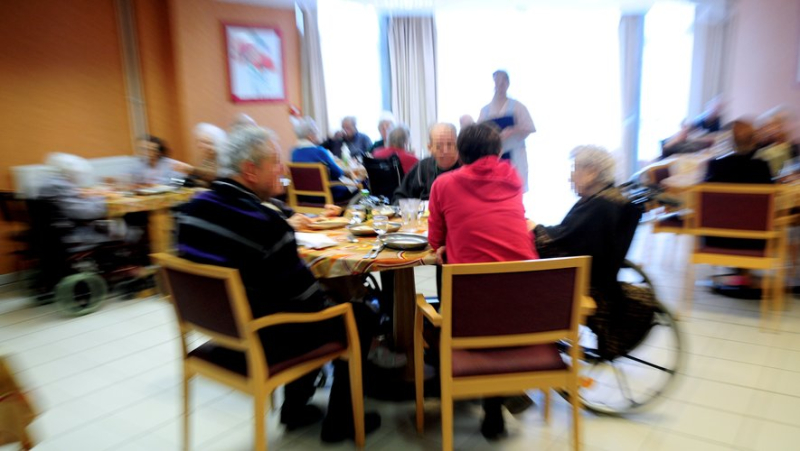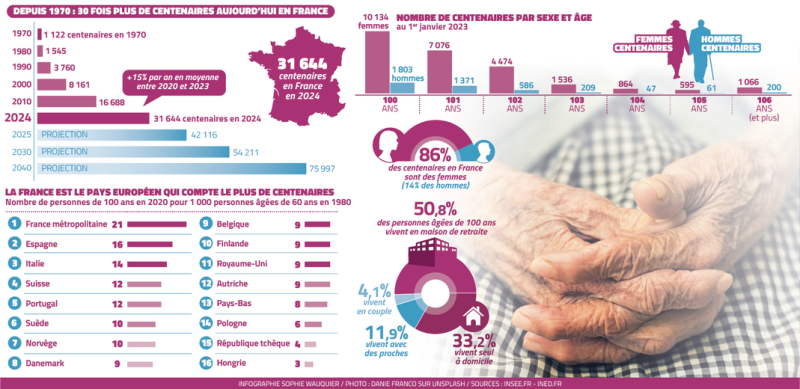There are more centenarians in France: advice from geriatrician Claude Jeandel for “better life expectancy in good health”

Respecter une alimentation équilibrée, maintenir un lien social… Des ingrédients, parmi d'autres, pour vieillir en bonne santé. Illustration Sylvie Cambon – SYLVIE CAMBON
A recent INSEE study shows that we now have 30 times more centenarians in France than 50 years ago. Explanations… and advice from the eminent Montpellier geriatrician and former president of the National Professional Council for Geriatrics, Professor Claude Jeandel.

Professor Claude Jeandel.
An INSEE study shows that there are 30 times more centenarians than there were 50 years ago, particularly in France. How to explain this phenomenon ?
There is a very strong correlation between life expectancy at birth and the probability of reaching 100 years of age. We have the characteristic, in France, of having the highest life expectancy in Europe for women, a little over 85 years, just ahead of Spain and this is reflected in the indicators on the number of centenarians. It is a mass effect, but also a demographic one, which the INSEE study demonstrates perfectly by comparing the number of people aged 60 in 1980 per 1000 inhabitants and, 40 years later, the same indicator for people aged 100 years. In both cases, France appears in first place. The study also highlights other criteria, such as sociocultural level which can play an important role: you are more likely to be a centenarian if you have a diploma.
Can the effectiveness of our health system also be an explanation?
Thanks to prevention work, we have long held a very good European rank in terms of healthy life expectancy, that is to say disease-free. This could have led to an overall improvement in health in France, therefore playing a role for people who are centenarians today, that is certain. But this ranking unfortunately tends to move in the other direction. This implies that we must be careful about projections over 10, 20 or 40 years. The study also presents different scenarios nuanced in particular by the effects of prevention.

There are 30 times more centenarians in France today. All the numbers… Infographic Sophie Wauquier
Women remain in the majority beyond the age of 100. Why ?
There has always been this differential in life expectancy between men and women. Logically, the probability of reaching 100 is therefore higher among women. The difference is even very significant, with only 14% men among centenarians. There has never been a patent explanation to explain it, only hypotheses which involve a part of genetics. There is also the famous debate over the protective role of estrogen. That said, the trend is towards a reduction in this differential, but we cannot yet measure it among centenarians.
Aging well can therefore be written in the genes ?
Indeed. But we must also take into account the effect of the environment. We talk about epigenetics, that is to say the interaction between the environment and genes, which explains, for example, that certain people are more likely to develop ;cancer than others or even exposure to risk factors. Those who do not have the genes for longevity must therefore protect themselves from all potential risk factors, more than those who have this genetic protection.
We live older… but in good health ?
Today, what interests geriatricians is life expectancy in good health, without loss of autonomy. Currently, this is obviously lower than overall life expectancy but until a few years ago, it was gaining years faster than overall life expectancy. This is a little less the case today. Certainly, there was the Covid crisis which had a strong impact, but that is not the only explanation. This may be linked to the fact that human behavior is evolving. What we have gained so far, for example with the reduction in tobacco consumption, we can lose again due to overweight or even obesity from childhood or adolescence which accentuates vascular risk.
How to give yourself the chance to age well ?
We must first act on the risk factors, particularly vascular ones, that is to say, regularly monitor blood pressure, diabetes, hypercholesterolemia. ;From the age of 50-60, check that there are no heart rhythm abnormalities, because today we have treatments that avoid the main complication which is heart rate. ;rsquo;stroke.
Then there are all the protective factors, that is to say a healthy lifestyle starting with a balanced diet which simply respects the recommended calorie intake. You must then have appropriate physical activity, the only way to act on several targets at the same time: it improves muscle mass and strength, it maintains the cardiorespiratory system, but also balance so it helps to avoid falls, it prevents depression. It’is essential, better than any medicine, and accessible to all.
Should we consult regularly, and from what age?
Prevention assessments at ages 25, 45, 65 and 75 are now launched. It is intended to seek in particular all these risk factors accessible to therapeutic means. This really is the solution. I take an example of Alzheimer's disease which scares everyone, the most common after the age of 65. Today there is no treatment for it, but studies have shown for a very long time that if we act on the risk factors as soon as they appear, hypertension and diabetes, we delay the onset of the disease. onset of the disease. I would even say that from age 65, and even more so at age 75, we must ask the question of possible dependence.
We predict 76,000 centenarians in France by 2040… And more generally an older population. Is society ready to face this challenge??
I will ask the question without setting an age. We will see a doubling of the number of people aged over 75, and therefore also a doubling of dependent people. Is society ready to welcome twice as many dependent elderly people? Clearly, it will be extremely difficult, given the situation in our establishments currently. We are not ready in terms of number of places and beyond in number of professionals. This will be a major challenge.
I subscribe to read more




